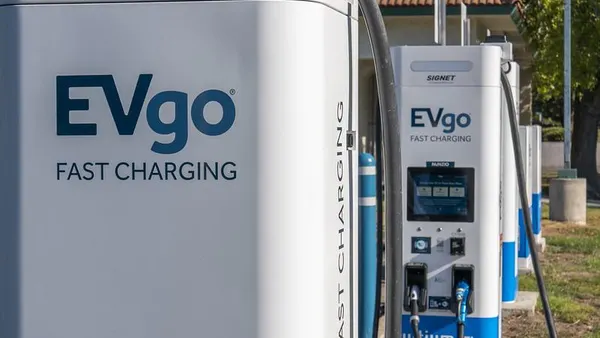Dive Brief:
-
Seventy-five percent of electric vehicle charging station developers and operators say electric grid limitations present a significant barrier to deploying commercial EV charging infrastructure, according to a survey released June 13 by Endeavor Business Intelligence and Xendee, an EV charging and microgrid design services provider.
-
The percentage of EV developers who say distributed energy resources and microgrids will enable them to overcome grid limitation rose to 89%, up from 74% in 2023.
-
A large number of Xendee's clients have been unable to secure the energy they need for their projects and have resorted to installing fossil fuel-powered generators to run their chargers, according to Michael Stadler, chief technology and marketing officer at Xendee.
Dive Insight:
Most developers of EV charging infrastructure have had trouble securing electricity for their projects in recent years, Stadler said.
Electric grid limitations topped Xendee's survey of EV charging developer pain points for the second year in a row — Xendee first launched the annual survey in 2023. Would-be EV charging station developers have increasingly found that they are unable to procure adequate electricity from utilities, Stadler said. Many have been unable to get information they need about the grid’s capacity from utilities in a timely fashion, and some regions have seen electricity prices spike above economic levels, Stadler added.
“Time of use rates and power charges are a really big problem,” he said. “If you end up paying more for electricity than gas, then something is wrong.”
Stadler said that these problems seem relatively uniform across multiple types of would-be developers and operators of EV charging stations — from energy companies such as Shell that might like to offer chargers at fueling stations, to logistics and shipping companies like FedEx looking to install chargers for fleets of commercial EVs.
Building out microgrids paired with solar or other distributed energy resources to support EV charging projects has also proven challenging, and the number of Xendee clients deploying microgrids has decreased slightly over the past year, Stadler said. Many of Xendee's clients have resorted to installing fossil-fuel powered generators to run charging stations, he said.
The assumption by many of these companies is that the overburdened, backlogged electric grid is a temporary problem, Stadler said. But he's not personally convinced.
“At the end of the day, the utilities will never be able to handle all this power because otherwise energy becomes too expensive,” he said. “I just don't like the idea that everyone is thinking short-term, that this problem is going away. We encourage people to think about a strategic approach to building a sophisticated microgrid where you install more renewable technologies when they become cheaper.”














